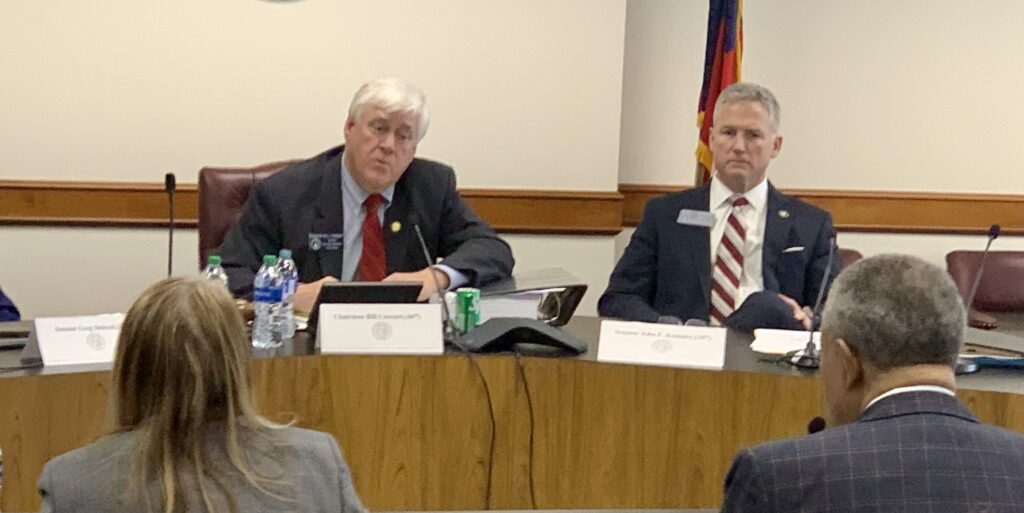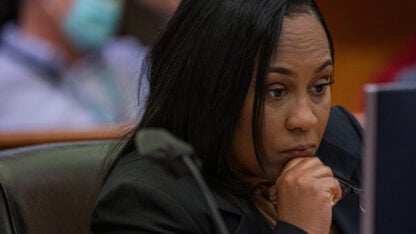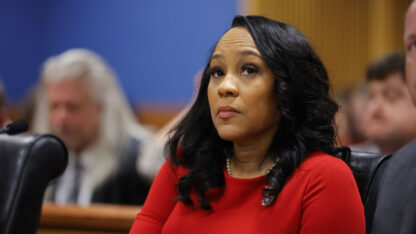A Georgia Senate special committee investigating the professional conduct of Fulton County District Attorney Fani Willis spent several hours Friday hearing testimony about the broad discretion district attorneys have over their budgets.
Republican state lawmakers trained their sights on DA discretionary spending after a Fulton Superior Court hearing revealed that Willis had hired a special prosecutor she was romantically involved with.
In the Senate Special Committee on Investigations hearing, the majority of the focus was on rules and regulations for District Attorney offices throughout the state, including a DA’s ability to hire special prosecutors and the allocation of other budgetary expenses.
Committee Chairman Bill Cowsert, an Athens Republican, said the hearing was intended to address concerns that county commissioners, the public, and others may have that Georgia DAs have too much control over how to run their offices.
Cowsert said he is concerned about budgetary disparities between less populated counties and “wealthy counties” that can afford to provide significantly greater funding resources for their district attorneys.
“I hate to see us have smaller counties that feel like they don’t have enough personnel because their counties can’t supplement it or they’re not playing their politics well enough or are not on the right side of the blue or the red to be getting the federal grants coming down,” he said.
The Senate committee’s hearing Friday was its first time meeting since May 23, when a former Fulton juvenile diversion program director alleged that Willis’ and DA staff improperly spent federal funds on gang prevention and empowerment programs.
Willis’ Fulton Superior Court 2020 presidential election interference case is now on hold while the Georgia Court of Appeals reviews a motion filed by Trump and several co-defendants seeking to remove Willis from the case. Their argument is that Willis should be disqualified as a result of an undisclosed romantic relationship he had with Nathan Wade, who she hired as a special prosecutor to oversee a case. Wade was paid about $700,000 from the county as the case’s lead prosecutor before he resigned this March under scandal.
Over the past few months, the committee has heard from expert witnesses ranging from a defense attorney who helped uncover the Willis romantic affair, high ranking Fulton County officials, and others.
Willis remains at odds with Cowsert’s panel over whether she should be forced to comply with a subpoena to testify before the committee.
The special investigation committee’s next meeting is scheduled for Sept. 13.
On Friday, three current and former district attorneys testified about how state, local, and federal grants trickle down to DAs offices.
The statewide Prosecuting Attorneys’ Council of Georgia oversees how DAs allocate state money, as well as how they provide resources such as assigning independent prosecutors to assist DAs’ offices in handling specialized cases.
It is not the council’s responsibility to discipline or remove district attorneys for misconduct, which is handled by a board of the State Bar of Georgia that determines whether a lawyer has violated a state’s professional conduct rules, the witnesses said Friday.
At Friday’s hearing, legislators wondered how they could help develop more ethical guidelines for district attorneys, including directing a controversial new prosecutors oversight commission to develop a code of conduct for local prosecutors
A majority of the state’s 50 district attorneys handle cases for several counties within a judicial circuit, operating on a shoestring budget compared to larger metropolitan areas, said T. Wright Barksdale III, district attorney for the Ocmulgee Judicial Circuit.
Wright said that county and judicial district types of cases differ greatly, and that while the county provides prosecutors with operating expenses, accountability for district attorneys takes place at the ballot box with the public deciding whether the money is being spent appropriately.
Fulton County’s district attorney’s office was recently criticized in an county audit, resulting in the DA’s attorneys arguing Willis as a constitutional officer has the authority to hire special prosecutors and case experts.
“The county can come in next year and say, ‘We don’t agree with that’ but the public needs to understand the county commissioners are giving large amounts of money to people that are spending it however, they have culpability and responsibility to make sure that what’s being spent is appropriate,” Wright said.
Porter suggested that county officials could try to reduce funds they believe were misappropriated in the next budgetary cycle, which could further encourage DA’s to follow county government regulations.
Porter said district attorneys have the same legal authority to control their budgets as other constitutional officers such as sheriffs, who are generally able to spend the state’s money as they see fit. The new prosecutor oversight commission will develop similar ethics conduct guidelines as the Judicial Qualifications Commission, the panel that oversees Georgia judges, Porter said.
A prosecutor’s disciplinary panel also investigates complaints filed against district attorneys, including the current complaint already filed against Willis related to the 2020 case. Willis has called the attacks from Trump and the GOP machine a “witch hunt” against her because she’s a Democrat and Black woman who stands up to Trump’s attempts to illegally overturn his loss in Georgia’s 2020 election.
Cowsert said he’s concerned that Georgia doesn’t have universal consistent codes of conduct for prosecutors.
“What are the ethical guidelines? What are the fair expectations of our citizens?” Cowsert said. “The reason is because, as far as I can tell, they’re only bound by the disciplinary rules and ethical guidelines of the State Bar of Georgia that apply to all attorneys.”
This story was provided by WABE content partner Georgia Recorder.









